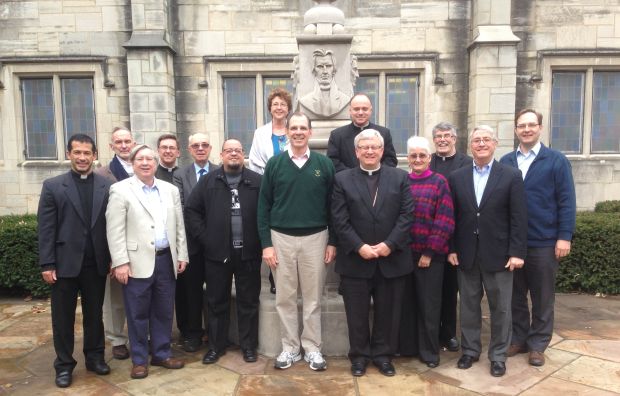Pope Francis said it best in his recent Apostolic Exhortation Evangelii Gaudium (“The Joy of the Gospel”). Ecumenical dialogue “is not just being better informed about others, but rather about reaping what the Spirit has sown in them.”
Father Joseph Shenosky thought about this quote as he participated in a session of the International Commission for Dialogue between the Disciples of Christ and the Roman Catholic Church held Jan. 8-12 in Knoxville, Tennessee.
The priest of the Archdiocese of Philadelphia is one of seven Catholic delegates to the ongoing ecumenical dialogue of the International Commission, which is co-chaired by Green Bay (Wisc.) Bishop David Ricken and Rev. Dr. Newell Williams, president of Brite Divinity School at Texas Christian University.
Father Shenosky presented a paper, “The Place of Eucharist in the Life of the Catholic Church.” Rev. Dr. Tom Best, retired director of the Faith and Order Division of the World Council of Churches, presented a paper “Citizens of Heaven: the Eucharist and the Christian Church (Disciples of Christ).”
[hotblock]
The Catholic Church has been in ecumenical dialogue with the Disciples of Christ at an international level since 1977. Father Shenosky was recently appointed to the Commission by Cardinal Kurt Koch, the president of the Pontifical Council for Promoting Christian Unity.
It is now beginning its fifth phase, during which over five years the delegates will discuss “Christians Formed and Transformed by the Eucharist.”
“The roots of the Disciples of Christ are in the Reformed tradition,” Father Shenosky said. “Their 19th century founders (Barton W.) Stone and (Thomas) Campbell trace their spiritual roots to Presbyterianism. Their ecclesial community is unique in that they have always desired to seek the full visible unity of the Church of Christ, and they have always believed that the weekly celebration of the Lord’s Supper is essential for Christian life.”
From its discussion, “the commission identified several points of common affirmations in our understanding and approach to the Eucharist, as well as naming some major points of difference and divergence which still need further exploration,” the official release issued by the commission said. “The commission understands this dialogue as a contribution toward realizing the long-range goal of full unity in one faith, one Eucharistic fellowship, and common life in Christ.”
Bishop Ricken said in the release that it is “a beautiful and challenging formal conversation around the teachings and practices in hopes of moving toward greater understanding and sharing in the life of faith.”
Rev. Dr. Williams noted “An important component of each of our dialogues session is the time we spend together in daily worship and prayer. In those moments we are reminded that the unity we seek is finally a gift of the Holy Spirit.”
Father Shenosky’s expertise in ecumenical affairs traces back to his four years of study at the Pontifical Gregorian University in Rome where his doctoral dissertation for his doctorate in sacred theology, “The Development of Late Twentieth Century Ecumenical Theology in the U.S.A.,” was published in the university’s Tesi Gregoriana Series.
Currently he is director of pastoral and apostolic formation at St. Charles Borromeo Seminary. His responsibilities include coordinating the Field Education Program, teaching theology in both the College and Theology Divisions and serving as a formation adviser to seminarians.
“I think our first meeting in Nashville was very beneficial because the team members had an opportunity to understand and appreciate more fully what both Catholics and Disciples believe about the Eucharist,” Father Shenosky said. “Our formal and honest theological discussions, the time spent in prayer, and our informal interactions were done in an attitude of mutual respect and friendship. Ultimately ecumenism involves relying on help from the Holy Spirit.”
The next session of the International Commission will be held in Rome, June 14-20.
***
Lou Baldwin is a freelance writer in Philadelphia.
PREVIOUS: Changes in priest, deacon assignments announced
NEXT: Hundreds of boys receive awards at Scout Mass in Cathedral




The Eucharist illustrates what The Holy Spirit taught me. “Two things can be true at once,” versus either-or as we are wont to–Catholics tend to defend against a “memorial supper” Saying the Eucharist is MORE than JUST a memorial supper. Before we move on to the “more than,” LET US EXAMINE “memorial supper”: “Do this IN MEMORY OF ME”; MEMORY is MEMORIAL!!! This was SAID BY JESUS.
But the argument is that non-catholics SAY JUST a memorial!!! Right?
Before focusing on the words “discerning the body-blood of THE LORD” WHICH CATHOLICS ARE WONT TO USE then let us back up to that Corinthians SCRIPTURE IN ENTIRETY THAT TELLS US we will become sick OR DIE from this regular ol’ MEAL OF “BREAD-AND”… (wine and not grape juice by the wayy)
DIE? This is NOT ‘regular ol’…NOT BY A LONG SHOT. Now, Look,…Catholics are saying THAT, that THIS IS NO REGULAR MEAL, BUT SUPERNATURAL!!! And so is THE BIBLE.
So. Memorial. MORE than bread-and-wine. Both THINGS CAN BE TRUE AT ONCE. And are.
ONCE one realizes THAT SOMETHING SUPERNATURAL IS GOING ON WITH THIS MEAL then ONE CAN AGREE TO “STOP WITH”–neglecting to add to the Scripture–“this is my body” and “this is my blood” EVEN IF IT IS METAPHORICAL to Realize THAT IT IS ALSO…SOMETHING MORE THAN PLAIN OL’ BREAD AND WINE…
I Tell, BELIEVE THE WORDS–AND TAKE THEM AS FAR IN THE HOLY SPIRIT AS THE HOLY SPIRIT WILL… You will discover much. STICK WITH THE SCRIPTURE.
DO NOT ARGUE ABOUT “EXTRANEOUS WORDS” WHICH EXPLAIN–AND LET THE HOLY SPIRIT DO THE EXPLAINING. Consider “transubstantiation” A DISCUSSION THAT IS 2ND OR 3RD GENERATION WORDS AND LIMIT THE DISCUSSION TO 1ST GENERATION WORD-IN-THE-BIBLE. That after all is what transubstantiation is supposed to EXPLAIN–LET US NOT FOCUS ON THE EXPLANATIONS. WE ARE INSERTING OURSELVES BETWEEN THE WORD AND THE PERSON–AND THE WORK OF THE HOLY SPIRIT IN THAT PERSON.+<3–CAPICHE?